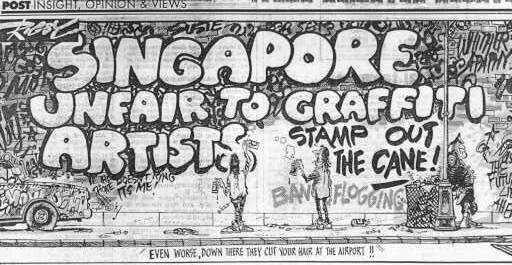
|
|
|
|
|
|
|
|
|
|
|
|
|

Imagine a country that is rabies free, chewing gum is illegal, any
form of firearms is prohibited, littering is an offense, pornographic articles
or video tapes are forbidden, and smoking is not allowed in public places.
Imagine in the same country, that caning is the punishment for vandalism
and death by hanging is the punishment for criminals who are convicted
of drug trafficking or possession of narcotics. These laws and regulations
make Singapore one of today’s safest countries, since they have one of
the lowest crime rates in the world. Many foreign countries argue
that Singapore uses an unjust method of penalizing their criminals, but
a whopping 83 percent of Singapore’s population voted to retain their current
method of punishing criminals. Though Singapore is happy with their
methods of punishment, other countries believe that these punishments are
equivalent to the effects of torture. Singapore officials are unfazed
by these accusations and claim that tough police methods and harsh punishments
give their nation one of the highest material standards in the world (Waxman).
When a medieval system of justice hurts foreign citizens, other countries
must take interest because their own citizens are open to abuse.
This is not an issue of foreign countries acting as policemen, but an issue
of protecting its own citizens, or informing them that their laws do not
stand in foreign countries.
In the past 8 years, there have been two cases where Singapore’s justice system has convicted foreigners and brought the country to national attention. The difference between the cases is that one convicted criminal lost their life. The first case deals with a Filipino women, Flor Contemplacion, who was hung on murder charges, despite new evidence shadowing doubt on her guilt. Two weeks before her execution, two co-workers came forward explaining how the little boy Contemplacion was accused of killing, drowned during an epileptic fit in the bathtub and his father blamed Contemplacion in an attempt to simmer his rage. The Singapore government denied further investigation and ordered the execution as planned, even after the Philippine government requested that Contemplacion not be hung on humanitarian considerations. Filipino President Fidel Ramos even went as far as personally contacting Singapore Prime Minister Goh Chok Tong to ask him for mercy, but Goh Chok Tong denied his attempt. Chok argued“When Contemplacion took the life of the child, she violated the countries sense of security and tore away at Singapore’s identity as a safe place to live” (Chicago Tribune).
The hanging lead to national outrage in the Philippines; the country’s
administration cancelled a planned visit from Goh Chok Tong and even went
as far as honoring Contemplacion as a martyr. According to the New
York Times, “Filipinos have overwhelmingly identified with Mrs. Contemplacion.
Millions have family members working abroad in jobs that make them vulnerable”
(Rand). Also, the majority of the Singapore police department had
to concentrate their efforts on calming over 75,000 Filipinos working in
Singapore. The recent Contemplacion case sets an example for foreigners
in Singapore can be subject to far more than caning, as in American Michael
Fay’s case
In the 1960’s, caning criminals in Singapore used to be reserved for
serious offenders of the law, but Lee Kuan Yew, a former dominant political
leader, pushed to having caning extend to criminals that vandalized because
during the 1960’s, graffiti had become popular in Singapore.
In 1994, many Americans were shocked to learn that Michael Fay, an 18
year-old American boy was convicted of vandalism in Singapore. Fay
was arrested while spray- painting 4 cars in a parking garage. The
first time that an American citizen was going to be punished under Singapore
law, Fay was sentenced to a penalty known as caning. During caning, a moisten
cane is beaten against the buttocks, causing the skin to break open and
blood to be drawn. Fay was going to be issued twelve hits against
his rear, four months in a Singapore jail, a 2, 200 dollar fine, not to
mention permanent scarring on his area of caning.
Immediately after receiving word of Fay’s sentence, President at the
time William Clinton protested Fay’s punishment and asked the governor
of Singapore for mercy. The Chief Justice in Singapore at the time,
Young Pung How, responded by saying “Acts of vandalism, even when committed
by first time offenders through the use of paint, deserve caning” (Strait
Times). After hearing Young Pung How’s statements, the American Embassy
questioned the judgment of the Singapore court for a second time.
This time, in their request for mercy, they included a letter of appeal
signed by 24 senators explaining that Fay had a history of emotional problems
and a punishment such as caning could create more psychological damage
that would take years to repair. This letter was backed by a group
of doctors out of Boson, who expressed concern that the bloody and bruising
effects of caning would cause emotional trauma. In response to these
appeals, Chief Justice How lowered the caning’s from twelve to six hits,
but the fine and imprisonment stood. Fay’s caning introduced penalties
that Americans in foreign countries are prone to.

What makes the situation worse is Singapore’s refusal to listen to the pleas of foreign governments and choosing to be protective of its own politics and judicial system. What is needed is more than appeals when situations arise. Foreign governments, along with the United States, need to look at their relations with Singapore and what they can do to prevent issues in the future. When the foreign Singapore General makes statements such as “You can walk down streets quite happily without fear of being mugged, assaulted, raped, or robbed, and look what’s going on in America” (National Public Radio), it does not seem to appear that Singapore will change their policies about treating their criminals, foreign or not. The people of Singapore want to make themselves the economic capital of Asia, rivaling Hong Kong. Singapore will not be able to compete in an atmosphere of fear, intimidation, and repression in which the market may be free, but not individual lives (Robbins). The American and Filipino people are questioning the cultural and moral values of Singapore in order to save their own citizens. It makes no difference, but by having ignorance of the justice system and its laws are not an acceptable excuse in foreign countries.
The fact is Singapore is content with their form of justice and do not want to hear what other countries think of their policies. “We believe that if you come to our country, you obey our rules or do not come,” says one Singapore citizen (China Post). Singapore has one of the highest execution rates in the world in relation to its population because Singapore, in the last decade, has carried out 340 executions (China Post). They emphasize the rule of law and their people abide because they follow the belief that community is more important than individualism and are barely concerned about such issues as capital or punishment, they simply want foreigners not to question how their justice system works. A Washington Post columnist argues that “The citizens of Singapore do not see their country as a boot camp for civilians because of its tough rules, America has to understand it is a different society” (Duke Chronicle). Fay was caught breaking the law and must be held responsible for his actions. He cannot expect his penalty to be appealed based on his nationality. Would Flor Contemplacion even think to have her sentenced lessened because she was Filipino? Perceiving this issue through American standards, this punishment may seem harsh and extreme, but it is worthy of gaining Presidential attention? With the concern of human rights, caning as a punishment for vandalism is small. Everyday, governments around the world kill their citizens, look at what is going on in present day Bosnia. These kind of violations need to be attended to and the United States should take a role in trying to stop them. If the Unites States believes that caning in Singapore is a human rights violation, then it should condemn caning at all times. Should it matter if the victim is an American or a citizen of Singapore? Instead of taking a stand when an American individual is in crisis, we, as Americans, should continually fight hardships that affect citizens of other nations.
When writing this paper I realized that Americans, as well as foreigners, take their basic rights for granted when they travel abroad and all their country can do is make sure their citizens are not being discriminated if they are convicted of a crime in a foreign country. This makes the cases of Contemplation and Fay a political issue because the Unites States and other foreign countries do not have the authority to protect their citizens under foreign law. Foreign countries view Singapore’s justice system as brutal and medieval, but to the citizens of Singapore, they feel as though their justice system excellent. The understanding of culture is necessary if there is going to be any type of settlement between Singapore and foreign country. This leaves one plausible solution to the problem; protect your citizens who are traveling in foreign countries by educating them of foreign rules and regulation.
“Always Caning.” China Post 29 April. 1994.
“Contemplacion Found Guilty.” New York Times
18 May. 1995.
“Fay to Appeal for Clemency by April 20.” Chicago Tribune
8 April. 1994.
Rand, Antonio. “Value Law and Order.” Toronto Star 13
July. 1999.
Robbins, Erik. “Docs to Singapore: Spare the Rod.” New
York Post 9 August. 1994.
“Singapore Explains Caning as Means of Punishment.” All Things
Considered National Public Radio. WBDU, Washington. 4 April.
1994.
Waxman, Peter. “No Cold Logic.” Buffalo News 12
April. 1996.
“What US Columnists Say About Fay’s Caning.” Strait Times
13 April. 1994.
“Whip it: Flogging Does Not Merit US Intervention.” Duke Chronicles
6 April. 1994.
Http://www.geocities.com/TheTropics/5994/laws.html This web site contains laws and regulations that should be known before traveling to Singapore.
Http://www.lectlaw.com/files/int21html This web site explains how the criminal system in Singapore works, who has the power to convict and issue penalties.
Http://www.expatsingapore.com/general/law.htm This web site takes an in depth look into the legeslation of Singapore. What the penalty is for committing such crimes as chewing gum or littering.
Http://www.singapore-window.org/112802st.htm This web site compares the crime rate in Singapore with that of recent years, allowing the reader to understand the recent trend in crimal activity.
Http://abcnews.go.com/onair/worldnewstonight/wnt990519_litke_story.html
This is a article written on Singapore's ability to monitor how their citizens
behave.
Site Created by: Jacob Teplesky